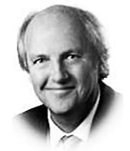
Howie's column is powered by Lyric Kitchen · Bar | eMail Howie
The coffee at the family lodge tastes like something filtered through a carburetor, but it keeps Ron awake long enough to rant about his latest Medicare letter.
“I’m not saying the government’s trying to steal my money,” he starts, “but they sure seem determined to hold it for observation.”
Darla looks up from her crossword. “You sign up for Part A, they say you need Part B. You take Part B, they tell you to buy D so your pills don’t bankrupt you. Nobody mentions Part Z, which is what you need for a nap afterward.”
Marty, the pharmacist, chuckles. “They don’t make a Part Z, Darla.”
“They will,” she says. “It’ll cover confusion.”
Rick slaps the table. “That’s the only thing they should cover! Half the folks I know are on more plans than deer tags.”
I sip my coffee and let them go. This is what passes for preventive care in northern Minnesota: we complain until our blood pressure drops.
Ron waves a bill the size of a fishing license renewal. “They charged me forty-two bucks for a facility fee. The only facility I used was the waiting room chair.”
Marty nods. “That’s a deluxe model. Comes with optional back pain.”
The laughter fades, and for a second we just listen to the stove pop. Nobody here’s rich. We’ve all paid into the system our whole lives, and we’d like to think it’ll be there when we need it. But every envelope feels like a new toll booth between us and the doctor.
Darla says her neighbor went in for a checkup and came out owing three hundred dollars for “non-covered diagnostics.” She swears the nurse only took her temperature. “Must’ve been a premium thermometer,” Darla says.
Ron grumbles. “I’m done feeding that beast. Nobody’s getting my hard-earned money unless they pry it out with surgical forceps.”
“Careful,” I tell him. “They’ll bill you for the forceps.”
The truth is, rural health care isn’t dying—it’s evolving into something the rest of us can barely afford to witness. The doctors are trying, the nurses are saints, but the paperwork alone could clog an artery. Somewhere along the line, healing became a subscription service.
Rick says his clinic just added “online scheduling.” He tried it once. “Took me forty minutes to create a password, another twenty to prove I wasn’t a robot, and the site crashed when I clicked ‘confirm.’ I think I have whiplash from refreshing.”
Marty grins. “At least you didn’t have to drive to Duluth for that disappointment.”
We all laugh, but it’s the kind of laugh that ends in a sigh. We’ve built a system so tangled that even the good people inside it can’t fix it. The only ones making sense are the ones making jokes.
Ron tops off his mug. “You know what I want, Howie? A clinic that takes cash, tells me the price up front, and doesn’t send me home with a survey.”
“Dreamer,” I say.
He shrugs. “Fine. Then just a doctor who answers the phone.”
The room goes quiet again. Outside, the winds push against the window. Inside, we’re all thinking the same thing: we’ll keep paying, keep signing, keep pretending it makes sense—because the alternative’s scarier than the bill.
Marty stands, stretches, and says, “Well, time for my daily deductible.”
We lose it—laugh so hard the coffee spills. For a moment, the whole stupid system feels small again.
That’s our medicine. Doesn’t cure much, but it sure helps us live with it.
Howie Hanson writes from Duluth, where he’s been poking the city’s sacred cows since before half the current council learned to parallel park. He runs HowieHanson.com, a one-man newsroom powered by caffeine, sarcasm, and an allergy to PR spin. Part reporter, part historian, part irritant, he still believes in telling the truth—even when it makes the room uncomfortable.

